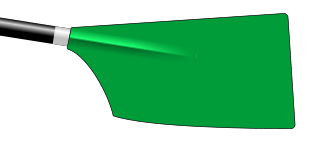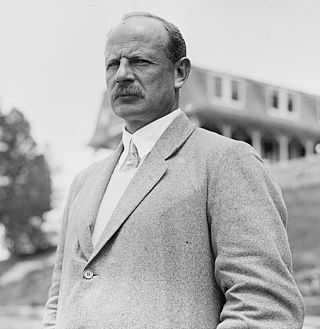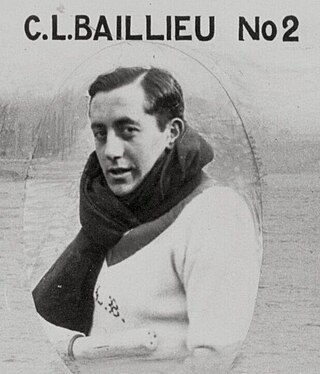Related Research Articles

The Head of the River Race (HORR) is an against-the-clock ('processional') rowing race held annually on the River Thames in London, England, between eights, other such races being the Schools' Head of the River Race, Women's Head of the River Race and Veterans' Head of the River Race. Its competitors are, with a few experienced junior exceptions, seniors of UK or overseas competitors and it runs with the ebb tide down the 4.25 mile (6.8 km) Championship Course from Mortlake to Putney which hosts the Oxford and Cambridge head-to-head races usually between one and two weeks later.

The Championship Course is a stretch of the River Thames between Mortlake and Putney in London, England. It is a well-established course for rowing races, particularly the Oxford and Cambridge Boat Race. The course is on the tidal reaches of the river often referred to as the Tideway. Due to the iconic shape of the Championship Course, in orthopaedic surgery, an S-shaped incision along the crease of the elbow is commonly referred to as "a boat-race incision resembling the River Thames from Putney to Mortlake."

Vesta Rowing Club is a rowing club based on the Tideway of the River Thames in Putney, London, England. It was founded in 1870.

Stephen Fairbairn was a rower and an influential rowing coach at Jesus College Boat Club, Cambridge University, Thames Rowing Club and London Rowing Club in the early decades of the 20th century, and founded the prestigious Head of the River Race in 1925.

Jack Beresford, CBE, born Jack Beresford-Wiszniewski, was a British rower who won five medals at five Olympic Games in succession. This record in Olympic rowing was not matched until 2000 when Sir Steve Redgrave won his sixth Olympic medal at his fifth Olympic Games.

Jesus College Boat Club is a rowing club for members of Jesus College, Oxford, one of the constituent colleges of the University of Oxford. The club was formed in 1835, but rowing at the college predates the club's foundation: a boat from the college was involved in the earliest recorded races between college crews at Oxford in 1815, when it competed against Brasenose College. In the early years of rowing at Oxford, Jesus was one of the few colleges that participated in races. Neither the men's nor the women's 1st VIIIs have earned the title of "Head of the River", which is gained by winning Eights Week—the main inter-college rowing competition at Oxford.

Guy Nickalls was a British rower who competed in the 1908 Summer Olympics as a member of the British eight that won gold, won 22 events at Henley Royal Regatta and won the Wingfield Sculls three times.
Peter Herbert "Jacko" Jackson was an English rower who competed at the 1936 Summer Olympics.

Christopher Latham Baillieu MBE is an English former rower who competed in the 1976 Summer Olympics and in the 1980 Summer Olympics representing Great Britain. He was the first chairman of British Swimming, from 2001 to 2008.
William Fawcus was a British rower and member of Tynemouth Rowing Club. He won the Wingfield Sculls and the Diamond Challenge Sculls at Henley Royal Regatta in 1871, being the first provincial competitor to do so.
William Sully Unwin was an English clergyman and amateur rower. He won the Diamond Challenge Sculls at Henley Royal Regatta and the Wingfield Sculls in 1884 and 1885, and rowed for Oxford in the Boat Race in the 1885 and 1886 races.
James Cardwell Gardner, also known by his nickname Jumps Gardner, was an English medical doctor and amateur rower who won the Diamond Challenge Sculls at Henley Royal Regatta and the Wingfield Sculls and rowed for Cambridge in the Boat Race in 1888, 1889 and 1890.
Benjamin Hunting Howell was an American rower who won the Diamond Challenge Sculls at Henley Royal Regatta and the Wingfield Sculls in 1898 and 1899.
Antony Duncan Rowe, or Tony Rowe, was an English rower who competed for Great Britain at the 1948 Summer Olympics and won the Diamond Challenge Sculls at Henley Royal Regatta in 1950. He was later a printer during a period of great change and developed "a successful model for short-run printing".
Sidney Charles Rand was an English rower who competed for Great Britain at the 1956 Summer Olympics and at the 1960 Summer Olympics. He won the Wingfield Sculls in 1954 and the Double Sculls Challenge Cup at Henley Royal Regatta in 1956.
David Philip Sturge is a former British rower who competed for Great Britain in the 1976 Summer Olympics.
Douglas V Melvin was a British rower who twice won the Wingfield Sculls, the amateur sculling championship of the River Thames.
The Argonaut Club was an English rowing club based on the Tideway of the River Thames that competed in the middle of the 19th century.
The Thames Club was an English rowing club based on the Tideway of the River Thames that competed in the middle of the 19th century.

The St George's Club was an English rowing club based on the Tideway of the River Thames that competed in the middle of the 19th century.
References
- ↑ Norfolk Sculls History
- ↑ Wingfield Sculls Record of Races
- ↑ "Anne Carpmael Trust". Archived from the original on 9 April 2009. Retrieved 18 July 2009.